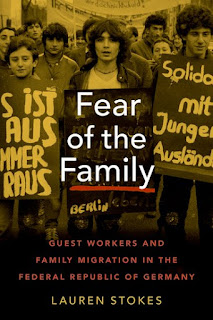 and race in Europe, and the history of gender and sexuality.
and race in Europe, and the history of gender and sexuality.
Stokes applied the “Page 99 Test” to her new book, Fear of the Family: Guest Workers and Family Migration in the Federal Republic of Germany, and reported the following:
Page 99 summarizes the previous chapter, which argued that the child allowance reform of 1974 was a pivotal event in how contemporaries interpreted family migration. In the 1960s and early 1970s, foreign workers in West Germany received the same amount of child allowance [Kindergeld] for children who lived in Germany and abroad. Beginning in late 1974, the same foreign workers received more money for children who lived in Germany than for those who lived abroad.Visit Lauren Stokes's website.
Page 99 shows how the West German state accused foreign parents who brought their children to Germany after this reform of “irresponsibly responding to an economic incentive” and of acting “out of short-sighted desire for financial gain rather than genuine emotional attachment.” Even seven years after the reform, in 1981, the Labor Ministry was gloomy about its ability to stop child migration. It lamented that foreign parents suffered from poor economic reasoning, which caused them to understand bringing their children to live with them as a good financial decision, even though raising children in Germany was obviously more expensive than raising children abroad.
Page 99 is an ideal introduction to the rest of the book, showing that contemporaries interpreted family migration as a form of “welfare migration” rather than as an anticipated consequence of families wanting to live together. This event is both consequence and cause of everything else that happens in the book, as very little strikes “fear” in the heart of the state more than a child welfare migrant.
I was delighted by this test because when I was trying to figure out the book’s argument to write an introduction, I performed my own “page test” where I distilled each MS Word page into a single argumentative phrase. I then used those 402 argumentative phrases to identify that the book’s four primary arguments are about race, gender, neoliberalism, and memory.
This page is centered around the third-most common argument by page count, “neoliberalism.” Page 99 cites Thomas Biebricher in support of my point that the Labor Ministry’s lament that parents didn’t understand economic reasoning was a version of neoliberal governance, which rests on “moral notion partly disguised as economic doctrine.” The problem with the Labor Ministry’s claim was that it had never drawn up a budget of what it cost parents to raise a child in Germany versus abroad. It had never considered the possibility that foreign parents had to pay the people who watched their children in a foreign country, or that it might be more expensive to maintain two households than one.
The claim that parents suffered from financial delusions was not based on economic logic. It was a moral claim, one that allowed the state to judge those foreign parents who continued to migrate with their children despite the fact that the state never missed an opportunity to inform them that those children did not belong. What did these parents think the ritual incantation “Germany is not an immigration country” meant? The West German state rarely agreed with migrants about what migration policy should look like, and for decades it resolved those disagreements by blaming the migrants for being irrational. That’s the conflict on this page, and it’s a conflict that will recur on nearly every page of this book.
--Marshal Zeringue



